- cross-posted to:
- [email protected]
- [email protected]
- [email protected]
- [email protected]
- cross-posted to:
- [email protected]
- [email protected]
- [email protected]
- [email protected]
Tesla braces for its first trial involving Autopilot fatality::Tesla Inc is set to defend itself for the first time at trial against allegations that failure of its Autopilot driver assistant feature led to death, in what will likely be a major test of Chief Executive Elon Musk’s assertions about the technology.



I can’t understand how anyone is even able to let the car do something on its own. I drive old Dacia Logan and Renault Scénic, but at work we have Škoda Karoq and I can’t even fully trust its beeping backing sensors or automatic handbrake. I can’t imagine if the car steered, accelerated or braked without me telling it to.
Aviation is now mostly full automatic. On the otehr hand, there are tons of beacons to help it.
It’s a difficult comparison to make because planes are maintaining level flight or making smooth wide-arcing turns or gradual changes in altitude, not quickly responding to imminent obstacles and traffic. Even in an autoland situation, it’s supposed to follow a gentle descent slope that’s planned long in advance. This type of operation isn’t really possible with cars, so they require a whole other set of considerations and techniques.
No it’s not at all, there’s still a ton of work for the pilot and first officer despite autopilot
And even private aviation requires hundreds of hours of experience and deep understanding of physics and extensive training before even being allowed in the air on your own. Let alone to fly others that’s a different training and license. Using those fancy “it flights itself” autopilots require several extra thousand hours of experience and specialized training, a commercial license and to be under the supervision and employment of an airline. Otherwise you are barely allowed to use the plane version of cruise control. Even after all that, you are still required to maintain your training with regular recertifications every few years, and a set of several hours of practice flight every year. Miss either condition and you lose your license.
There’s less stuff to hit in the air.
And it requires way more training and attention from the operator because that way they can react quickly. Not so much for cars, especially on “autopilot”.
I think it’s fine at the level where you are there and ready to take control, but you need to be paying attention still. Humans aren’t flawless and we shouldn’t expect our automated systems to be either. This doesn’t excuse Tesla, because they’ve been marketing it as something it’s not for a long time now. They’re driver assist features, not self driving features. It can keep you in a lane and maintain speed well, but you shouldn’t fully trust it. If it’s better than humans at some tasks, it should be used for those regardless of if it will fail at it sometimes. People shouldn’t be lied to and convinced it’s more than it is though.
I actually think that the less a driver has to do, the worse they’ll be at reacting when a situation does come up.
If I’m actually driving and someone, say, runs out in front of me, I’ll slam on the brakes. I’ve had this happen, actually - it was scary as hell because my brain froze up, but…fortunately for us and the guy, my foot still knew what to do, and we stopped in time.
But if I’m sitting in the seat, just monitoring, not actively doing something, my attention is much more likely to wander, and when that incident happens, my reaction time is likely going to be a LOT slower, because I have to “mode shift” back into operating a car, whereas I was already in that mode in the incident above. I don’t think the manufacturers are adequately considering this factor.
(I recognize this might not be a perfect example with automatic brakes, but I think the point is clear.)
deleted by creator